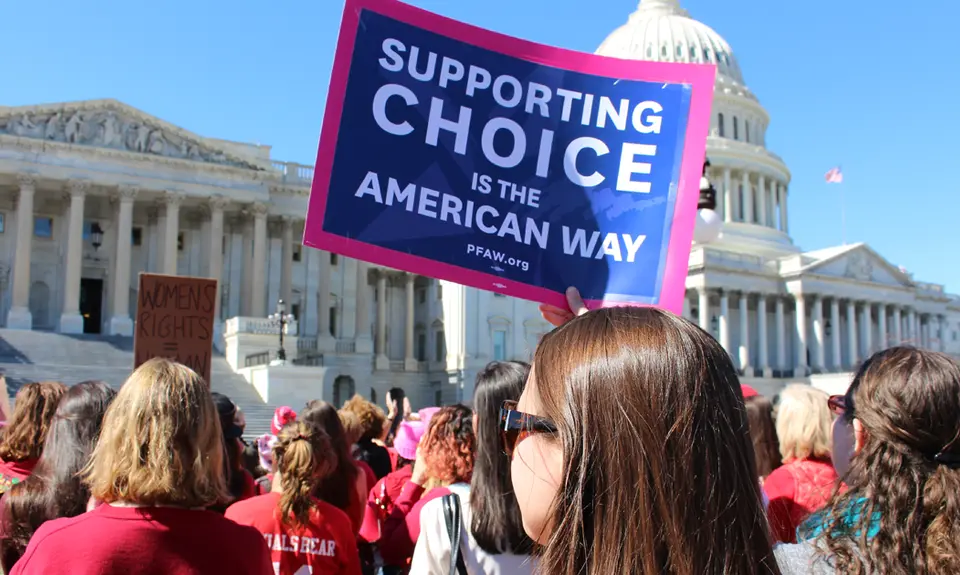Forty-eight years ago today, the Supreme Court issued its decision in the landmark abortion case Roe v. Wade.
That day, the Supreme Court majority, which included five Republican-appointed justices, ruled that a state law that outlawed abortions was unconstitutional under the 14th Amendment’s protection of the right to privacy. The decision marked a critical milestone for legalizing abortion as a constitutional human right and drastically reduced the number of dangerous, illegal abortions, which in 1965 accounted for 17 percent of all pregnancy- and childbirth-related deaths. But it also sparked a fervent anti-choice movement and turned the religious right into a major player in our government, our policies and our politics.
Unlike the Supreme Court composition of 1973, today’s Supreme Court reflects the damaging impact of nearly 50 years of harmful anti-choice activism from the religious right: All six Republican-appointed justices—a majority of the Court—actively oppose abortion rights. Three of these justices were appointed by Donald Trump and reflect his litmus test for Supreme Court justices: that they would overturn Roe v. Wade. Indeed, Trump’s Supreme Court – and the dozens of his anti-choice appellate court appointees – have steadily chipped away at abortion rights one decision at a time.
This year’s anniversary marks a critical moment for abortion and reproductive rights advocates. With an anti-choice majority on the Supreme Court bench, the threat of Roe being overturned – or gutted beyond practical application – is all too real.
There are currently four cases the Supreme Court is deciding whether to hear during its 2020 – 2021 term that aim to restrict abortion rights – and more than a dozen more pending in our federal courts of appeal. Among the proposed restrictions included in these cases are attempts to ban abortion as early as six weeks, attempts to ban common surgical abortion methods and medication abortions (also known as the abortion pill) and attempts to ban abortions because of fetal abnormalities.
Although none of these cases directly challenge Roe, they all could significantly undermine abortion rights and lay the groundwork for Roe to be overturned. If that happened, abortion rights would be subject to state law – and the 10 states that already have trigger laws in place would immediately outlaw abortion. In addition, the pre-Roe abortion restrictions that are still in place in nine more states could take effect, leaving people in those states without abortion access.
The majority of Americans support abortion rights, as has been the case for many years. And on Roe’s 48th anniversary, we must recognize that there is still an urgent need to fight for the will of the people by protecting Roe and fighting for access to abortion care – particularly for people of color and those who struggle financially – and lack the financial or logistical ability to exercise their right to care.
People For is grateful for President Joe Biden’s commitment to protecting and codifying Roe and for his opposition to legislation like the Hyde Amendment, which prohibits the use of Medicaid or other federal funding for abortion. And as abortion and reproductive rights activists, may we all be inspired by the president’s promise to “build back better” and recommit to doing that by protecting abortion rights and fighting to expand access to abortion care.
We can do that in many ways, including these three:
- We can continue to sound the alarm about Trump’s anti-choice judges and the impact of their damaging decisions on the hundreds of thousands of people under their jurisdiction.
- Hot off the heels of the momentous 2020 elections, we can continue to build power in our communities to support and elect progressive, pro-choice lawmakers. That includes supporting and electing progressive, pro-choice U.S. senators who are responsible for confirming our federal judges and state and local officials who have committed to fighting anti-choice state laws and protecting abortion rights in state legislation.
- We can fight political gerrymandering in our districts, which enabled anti-choice legislators to pass 479 laws that rolled back abortion rights from 2011 to 2019, by calling upon our senators to pass the For the People Act.
Biden and Harris’s inauguration on January 20 was a powerful reminder of what the people can achieve when we work together to make our voices heard. But with abortion rights under assault in our federal judiciary and in our states, now is not the time to stop doing the work of democracy – and we must do all we can do to protect Roe v. Wade and expand abortion access for all.
